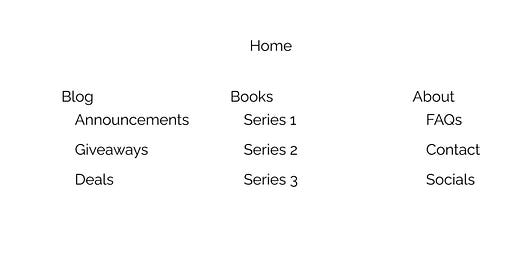A quick promo before the main part of this episode!
As summer comes to a close, there are some end of summer promotions from the Kindle Vella author community!
https://books.bookfunnel.com/summerkindlevella/wzpfrgabcy
and
https://books.bookfunnel.com/kindlevellamysteryfrantasyandmore/9lscvotql5
The first 3 episodes of every Vella are free so you can browse and read a bit to try before delving deeper into the story!
Whether you’re a new or seasoned author, you’ve decided that you want to get your own website. A website is a great way to have your own home on the internet. Yes, social media is invaluable for anyone with a business, but social media is busy and you’ll spend most of your time competing with other creators so your readers can see maybe one of two of your posts. However, you can also use social media and good SEO to draw readers to your own website where they can see ALL of your work, as well as all your social media links so they can follow wherever they wish to see your content.
Now, one of the obvious things you can do with your website is get readers on your newsletter so they can get updates on your new releases, but they can also explore your backlist in an organized way (hopefully, we’ll get back to that). No more sifting through your Amazon author page or GoodReads! On your own website you can sort your series however you wish, by popularity, release order, or however else.
On the topic or sorting your work: think of your body of work as your portfolio. To reach your audience, your website should make that portfolio easy to browse and find. From a web design perspective, this is where a sitemap becomes important. A sitemap will help you visualize the organization of your website. Prolific authors usually have a large backlist, so organizing that backlist on a website is crucial to make sure a reader finds what they are looking for. More than once, I have seen authors use tagging and blogging to showcase their work and while this is good for release information, this shouldn’t be how you present your body of work as a whole since old releases quickly get lost in the pile of blog entries. Below is an example of a simple sitemap that might be used for an author with several series:
The sub categories could be separate pages or they could simply be present on the page of the main category. For example, I recently did a website for an author with multiple series. Because of the large body of work, I created a page for each series to be linked on the front page, but I also included a Books page where a reader could view ALL the work from the author. This might sound like a lot of updates, but the website builder I use has something called Site Canvases. This feature will allow her to easily update her website with new books by updating only one canvas for that series and it will apply to any other page that use that Site Canvas.
Another great advantage of having your own website is that you’ll probably be able to use Google Analytics. Yes, Linktree and other sites have their own analytics page, but one feature I like about Google Analytics is: not only will you know what visitors came to your site but also what pages they clicked on, how long they spent on those pages, how many of those visitors were new to your site, and so much more. In terms of Google Analytics, I use it on my “Linktree“ page on my site to analyze where my traffic is coming from and how many visitors I have to that page. I can also view which external links a user clicked on, so I can view which of my links are the most popular amongst visitors. There’s a ton of data on Google Analytics you can use to drive sales and reach your readers. What I’ve mentioned so far is only the tip of the iceberg. All of that data will help you reach your readers and aid you in your author business!
So there are few whys behind an author website. If you come away from this article still not convinced, at least grab a domain preferably with your name listed in the URL. On Google Domains a URL is usually 12$/yr. You can start using that to forward traffic to your Linktree or other service you might use, so when you do eventually get a website you won’t have to change your links on all of your socials.
I hope you enjoyed this post and I’m looking forward to bringing more information to you!






Share this post